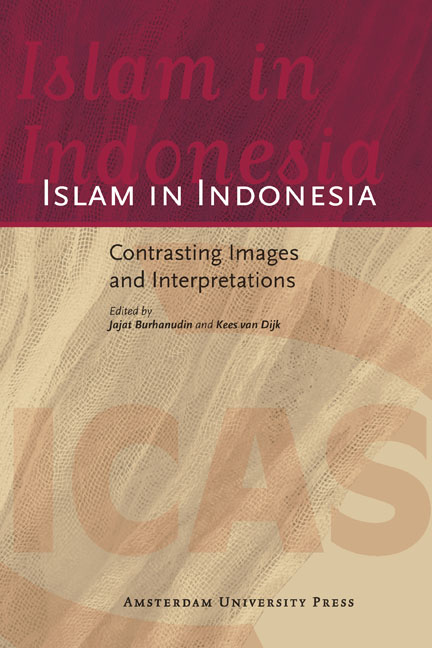Book contents
- Frontmatter
- Contents
- Introduction
- 1 Comparing Different streams of Islam: Wrestling with Words and Definitions
- 2 Defining Indonesian Islam: An Examination of the Construction of the National Islamic Identity of Traditionalist and Modernist Muslims
- 3 Indonesia in the Global Scheme of Islamic Things: Sustaining the Virtuous Circle of Education, Associations and Democracy
- 4 Distinguishing Indonesian Islam: Some Lessons to Learn
- 5 Islam, State and Society in Democratising Indonesia: A Historical Reflection
- 6 The Politics of Piety in the Pondok Pesantren Khusus Waria Al-Fattah Senin-Kamis Yogyakarta: Negotiating the Islamic Religious Embodiment
- 7 The Indonesian Muslim Feminist Reinterpretation of Inheritance
- 8 Managing Familial Issues: Unique Features of Legal Reform in Indonesia
- 9 A new Generation of Feminists within Traditional Islam: An Indonesian Exception
- 10 Religious Pluralism and Contested Religious Authority in Contemporary Indonesian Islam: A. Mustofa Bisri and Emha Ainun Nadjib
- 11 Islam and Humanitarian Affairs: The Middle Class and New Patterns of Social Activism
- 12 Dakwah radio in Surakarta: A Contest for Islamic Identity
- 13 Muslim Fundamentalism in Educational Institutions: A Case Study of Rohani Islam in High Schools in Cirebon
- 14 Majlis Tafsir Al-Qur’an and its Struggle for Islamic Reformism
- Glossary
- About the Editors and Contributors
- Bibliography
- Index
- Monographs
5 - Islam, State and Society in Democratising Indonesia: A Historical Reflection
Published online by Cambridge University Press: 09 January 2021
- Frontmatter
- Contents
- Introduction
- 1 Comparing Different streams of Islam: Wrestling with Words and Definitions
- 2 Defining Indonesian Islam: An Examination of the Construction of the National Islamic Identity of Traditionalist and Modernist Muslims
- 3 Indonesia in the Global Scheme of Islamic Things: Sustaining the Virtuous Circle of Education, Associations and Democracy
- 4 Distinguishing Indonesian Islam: Some Lessons to Learn
- 5 Islam, State and Society in Democratising Indonesia: A Historical Reflection
- 6 The Politics of Piety in the Pondok Pesantren Khusus Waria Al-Fattah Senin-Kamis Yogyakarta: Negotiating the Islamic Religious Embodiment
- 7 The Indonesian Muslim Feminist Reinterpretation of Inheritance
- 8 Managing Familial Issues: Unique Features of Legal Reform in Indonesia
- 9 A new Generation of Feminists within Traditional Islam: An Indonesian Exception
- 10 Religious Pluralism and Contested Religious Authority in Contemporary Indonesian Islam: A. Mustofa Bisri and Emha Ainun Nadjib
- 11 Islam and Humanitarian Affairs: The Middle Class and New Patterns of Social Activism
- 12 Dakwah radio in Surakarta: A Contest for Islamic Identity
- 13 Muslim Fundamentalism in Educational Institutions: A Case Study of Rohani Islam in High Schools in Cirebon
- 14 Majlis Tafsir Al-Qur’an and its Struggle for Islamic Reformism
- Glossary
- About the Editors and Contributors
- Bibliography
- Index
- Monographs
Summary
Introduction: an overview
Present-day Indonesia can be seen as a highly complicated spectrum of Islamic reactions to dealing with the place of religion in relation to the nation-state and society at large. If the attitude and behaviour of the people can be used as the prism through which this phenomenon is viewed, then a certain continuum in the mode of behaviour of the ummah, the Islamic community, emerges. This continuum ranges from extreme impatience with and intolerance to the slightest differences, to an extremely broad-minded stance towards all sorts of religious pluralities in society. While the former, albeit tiny, minority readily expresses itself in diverse hostile operations, the latter, the majority of the nation, can be divided into two broad categories. The first never hesitates to condemn whatever atrocities are conducted in the name of religion; the second gives the impression that it has little understanding of the meaning and the purpose of such hostile acts.
The nature of the Islam-based social and political ideology is to some extent related to the mode of behaviour of its respective supporters. The greater the devotion of the people to the notion of what is now usually labelled ‘militant Islamism’ – what used to be called ‘radical fundamentalism’ – the more likely it is that its adherents will be intolerant to the plurality of opinions; and, vice versa, the more liberal its ideological stand, the greater the possibility that there is acceptance of the right of others to exist. Here, the older and larger Islamic organisations such as Muhammadiyah, the Nahdlatul Ulama (NU), Persis and Al-Irsyad are frequently caught in the middle. Since they are more concerned with the development of their schools, universities, hospitals, orphanages and other social and religious activities, they are sometimes left out of the dynamics of heated religious controversies. In this situation, who would be surprised to learn that some Muslim leaders felt the urge to establish the Center for Moderate Islam?
The increasing plurality of religious ideas and the intrusion of processes of globalisation into the national community have often left older and larger (and, at the same time, more tolerant and open-minded) religious organisations on the defensive.
- Type
- Chapter
- Information
- Islam in IndonesiaContrasting Images and Interpretations, pp. 75 - 90Publisher: Amsterdam University PressPrint publication year: 2013



